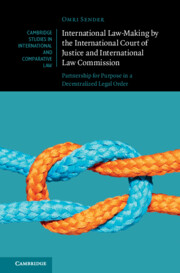52113 results in International relations and international organisations
4 - A Liberal International Organization with an Illiberal Core? Eurasian Economic Union and International Crises in Eurasia
-
-
- Book:
- International Organizations Amid Global Crises
- Published by:
- Bristol University Press
- Published online:
- 16 April 2025
- Print publication:
- 23 October 2024, pp 68-88
-
- Chapter
- Export citation

International Law-Making by the International Court of Justice and International Law Commission
- Partnership for Purpose in a Decentralized Legal Order
-
- Published online:
- 22 October 2024
- Print publication:
- 27 June 2024
Two worlds, one nation? Comparing the political spaces of Flanders and Francophone Belgium
-
- Journal:
- European Political Science Review / Volume 17 / Issue 2 / May 2025
- Published online by Cambridge University Press:
- 22 October 2024, pp. 279-296
-
- Article
-
- You have access
- Open access
- HTML
- Export citation
Are ideological and partisan affinities determining voters’ support of arms deliveries? Insights from a large-scale survey experiment in France and Germany
-
- Journal:
- European Political Science Review / Volume 17 / Issue 1 / February 2025
- Published online by Cambridge University Press:
- 22 October 2024, pp. 1-21
-
- Article
-
- You have access
- Open access
- HTML
- Export citation
Fighting collective threats: socialist revolutions and the management of the COVID-19 pandemic
-
- Journal:
- European Political Science Review / Volume 17 / Issue 2 / May 2025
- Published online by Cambridge University Press:
- 22 October 2024, pp. 221-238
-
- Article
-
- You have access
- Open access
- HTML
- Export citation
Legislative communication and power: measuring leadership in the U.S. House of Representatives from social media data
-
- Journal:
- European Political Science Review / Volume 17 / Issue 1 / February 2025
- Published online by Cambridge University Press:
- 22 October 2024, pp. 143-166
-
- Article
-
- You have access
- Open access
- HTML
- Export citation
Cleavage theory meets Bourdieu: studying the role of group identities in cleavage formation
-
- Journal:
- European Political Science Review / Volume 17 / Issue 1 / February 2025
- Published online by Cambridge University Press:
- 22 October 2024, pp. 110-127
-
- Article
-
- You have access
- Open access
- HTML
- Export citation
Conceptualizing Mano Dura in Latin America
-
- Journal:
- Latin American Politics and Society , FirstView
- Published online by Cambridge University Press:
- 15 October 2024, pp. 1-16
-
- Article
-
- You have access
- Open access
- HTML
- Export citation
Forging support: when there is no alternative to ‘there is no alternative’
-
- Journal:
- European Political Science Review / Volume 17 / Issue 1 / February 2025
- Published online by Cambridge University Press:
- 14 October 2024, pp. 80-98
-
- Article
-
- You have access
- Open access
- HTML
- Export citation
Does it matter that an ally is democratic during crises? Public diplomacy and attitudes towards international allies in times of crisis
-
- Journal:
- European Political Science Review / Volume 17 / Issue 2 / May 2025
- Published online by Cambridge University Press:
- 14 October 2024, pp. 318-337
-
- Article
-
- You have access
- Open access
- HTML
- Export citation
Revisiting the Chilean Road to Socialism
-
- Journal:
- Latin American Research Review ,
- Published online by Cambridge University Press:
- 14 October 2024, pp. 1-12
-
- Article
-
- You have access
- Open access
- HTML
- Export citation
Brett J. Kyle and Andrew G. Reiter. Military Courts, Civil-Military Relations, and the Legal Battle for Democracy: The Politics of Military Justice. Abingdon: Routledge, 2022. Figures, tables, index, 252 pp.; hardcover $144, paperback $43.99. – ERRATUM
-
- Journal:
- Latin American Politics and Society , FirstView
- Published online by Cambridge University Press:
- 14 October 2024, p. 1
-
- Article
-
- You have access
- HTML
- Export citation
The Massacre of Corpus Thursday: A Historical Approach Through Images
-
- Journal:
- Latin American Research Review / Volume 60 / Issue 1 / March 2025
- Published online by Cambridge University Press:
- 10 October 2024, pp. 137-157
-
- Article
-
- You have access
- Open access
- HTML
- Export citation
Indigenous and Black Autonomies and Resistance
-
- Journal:
- Latin American Research Review / Volume 60 / Issue 1 / March 2025
- Published online by Cambridge University Press:
- 04 October 2024, pp. 201-212
-
- Article
-
- You have access
- Open access
- HTML
- Export citation
Do immigrants at bay keep the xenophobes away? Post-entry rights and public opposition to immigrant admission
-
- Journal:
- European Political Science Review / Volume 17 / Issue 1 / February 2025
- Published online by Cambridge University Press:
- 30 September 2024, pp. 128-142
-
- Article
-
- You have access
- Open access
- HTML
- Export citation
The active, the sympathetic, and the reluctant: political action and eco-social attitudes among Swedish residents
-
- Journal:
- European Political Science Review / Volume 17 / Issue 2 / May 2025
- Published online by Cambridge University Press:
- 30 September 2024, pp. 185-201
-
- Article
-
- You have access
- Open access
- HTML
- Export citation

Weimar's Long Shadow
-
- Published online:
- 26 September 2024
- Print publication:
- 27 June 2024
References
-
- Book:
- Why the European Union Failed in Afghanistan
- Published by:
- Bristol University Press
- Published online:
- 03 January 2025
- Print publication:
- 26 September 2024, pp 221-261
-
- Chapter
- Export citation
4 - Terrorism, Solidarity and European Marginalization
-
- Book:
- Why the European Union Failed in Afghanistan
- Published by:
- Bristol University Press
- Published online:
- 03 January 2025
- Print publication:
- 26 September 2024, pp 104-124
-
- Chapter
- Export citation
Acknowledgements
-
- Book:
- Why the European Union Failed in Afghanistan
- Published by:
- Bristol University Press
- Published online:
- 03 January 2025
- Print publication:
- 26 September 2024, pp vii-viii
-
- Chapter
- Export citation


